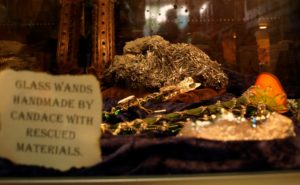Story and photography by Sarine Guerian
@sarinegulerian
Double, double toil and trouble has always been brewing for those who practice the ancient craft of magic. It’s the final taboo. Despite the portrayal in popular media, witches don’t practice animal sacrifice, cast evil hexes or fly around on brooms.
They do, however, perform naked rituals in the woods.
Wicca is still in it’s infancy. Less than a century old, it is one of the larger branches on the ancient tree of Pagan faiths. It was first introduced to the public in 1954 by an eccentric novelist named Gerald Gardner. Despite popular belief, there is no worship of Satan in Wicca. In fact, there is no belief in Satan at all. This is where the misunderstandings begin.
“In the dark of night, when something goes bump everybody fears that it’s going to be something scary,” said Lisa Forryan, a 52 year-old British Traditional Wiccan High-Priestess—a title that takes ten years of studying to obtain. “I think people are more willing to believe in magic in a more positive way now. I think it’s a slow process…There is always that fear.”
A homey and soft-featured woman, Forryan is not someone you would suspect to be a high-ranking Wiccan Priestess. If she came knocking on your door for a cup of salt, you’d hardly guess that it was to be sprinkled on her alter or used to cast a magic spell.
The only give away would be her traditional red and black striped socks tucked into her pointy boots. “The socks are fun. This is about as witchy as I get,” she said while wiggling her feet.
In the colourful backroom of Pheonix Rising Metaphysical Emporium, a narrow and stuffed one-stop shop for all your spiritual needs, Forryan sits cupped in a hand-shaped chair shuffling her tarot cards. Among the wands, robes and potions, you can find trinkets of any faith hanging on the walls, displayed behind glass or scattered all around the shop that smells heavily of sage and lavender. The most precious and invaluable thing in the store is not for sale. It’s a hand-bound leather book full of 14 magician spells. This sacred Wiccan collectable includes an array of colourful potions that the public is not allowed to touch.
Witches and the public alike pass through the shop, which has become somewhat of a community centre for Wiccans since its opening over a year ago.

SPELLS AND MAGIC
I’ve put a spell on you—and now you’re mine!
If it were that simple, we’d all be married to Kit Harrington right now.
Well, to become a chemist a student must go through tedious schooling and intensive examinations to be certified. They can’t simply read the books, practice at home and become a professional. The same applies to Wiccans and witches who want to practice magic and spell casting.
Magic is neither hereditary nor a genetic trait. You are not born a witch. Witchcraft can be practiced by anyone. The only condition being is that one must join a coven and go through the initiation process to really become a official—this may, or may not, involve dancing naked in the woods.
The applicant must find someone to train them, pass tests and make it through (secret) initiations in order to earn a title. Although the initiation process is a hush-hush, Forryan insists there is nothing like blood sacrifice involved in the practice. After this, you are given a coven name; a magical name that cannot be disclosed to anyone outside the coven.
This tradition was a safety measure originated from the days when witches would be tortured and interrogated for information.
Spells are not a simple wand-wave paired with a rhythmic chant. According to Forryan, spell casting is almost parallel to prayer. “I mean, you’re asking the gods, or whatever deity, the energy flow to bend in a way to make something happen in your favour,” she said. You set an intention for the prayer and focus your energy on that intention. “When I summon a god or a goddess, what I do is, I connect up with the universal energy and create a form that represents that goddess to me.” This will fester into a new energy that you can release to through several different methods. You can burn something—the most popular choice amongst witches is lighting a candle. You can use a wand and send it through air or even put that energy into something and bury it into the ground.
It’s a subjective process dependent on what you prefer to do, “Everyone has the thing that they have an affinity for,” said Forryan. “I like candles because I can carve things into them and anoint them with oils and kind of bring it all together…I like candle magic because I can see it progress. I can see the candle burn down.” Like most religions, Wiccans have altars containing salt, water, candles, incenses and whatever else they prefer.
Spells, like prayer, are requests for anything one wants—as long as you’re willing to pay the price for whatever it is.
In Wicca, there is The Rule of Three: an ideology that states whatever you request, good or bad, you must expect it to come back to you threefold. For example, if you cast a spell wishing ill intent and bad luck on someone, you have to prepare for that karmic reaction to multiply by three and come back at you. This enforces personal moral responsibility as a precaution to veer away from dark magic.
This rule keeps the spellcaster aware of the influence their magic has on themselves. “It’s not white light new age magic. Generally, it’s a grey magic where we do the best for all intended but we know that the route to hell is paved with good intentions,” explained Forryan. “Humans are humans. If you’ve got a broken personality it doesn’t matter what faith you belong to, you’re going to turn it somehow negative.”
Despite being able to request whatever you wish, there are two things any good Wiccan knows; you cannot force or direct someone’s will and you should never cast a spell on behalf of someone else.
For example, if you are in love with Joe but Joe is not in love with you, you cannot use magic to manipulate his feelings. “You can do a love spell but what you do is go, ‘these are the desired things I want and the non-desired things. Please bring somebody into my life that fits this description for the best good for both of us.’ Because, Joe may not meet that and you won’t realize it until you’re attached to him then your stuck with him,” said Forryan.
The reason you should never cast a spell for someone else is that you then take responsibility for whatever the outcome of that spell is. Another reason this is avoided is because one has to desire something powerfully enough to be able to manifest a spell. To have someone cast a spell for something they don’t truly desire will have less of an effect.

HALLOWEEN
Ding-dong! Trick or treating wasn’t invented by the candy companies and Halloween isn’t just a celebration for kids; it’s still a significant day for witches, wiccans and pagans.
According to Forryan, Halloween is one of the two times during the year when the walls between the world of the living and dead are the thinnest. It is the day where spirits of the dead visit and those who died during the year crossover.
The belief that the dimensional walls are the thinnest on this day originates from a time in history when traditionally October 31 was the day full of death. It was the day when all the animals would be ritually slaughtered and their blood would be used to bless, nourish and fertilize the fields for next spring. After which they would have a big party and enjoy the last fresh meal before the crops begin to decay and meat gets salted. After this Harvest Festival, the trials and tribulations of winter began when survival is uncertain.
But the dead are not the only intruders crisscrossing between dimensions. “[Halloween] is when the fairies moved home,” said Forryan. “So you didn’t want to be out at night because they might capture you and take you out to the Fairy Hill.” Fairies are mischievous creatures, loyal only to themselves.
If you were forced to go out into the night, you would have to disguise yourself in a costume or else risk being kidnapped by the nasty little creatures and taken to Fairy Hill where you would be stuck in limbo forever. “It’s pretty scary stuff. If you find a Fairy Hill and you walk around it three times, the door to Fairy Hill will be open then you’re in serious trouble,” Forryan warns. Our current culture of Halloween stems from this belief.
And what of the pumpkins that we carve jack-o-lanterns into and leave on our doorsteps? “Pumpkins are a North American thing,” she said. “We used turnips. They would carve out turnips and make scary faces out on them and use those to scare the pixies.”
Today, when fresh meat and crops are readily available everyday, Forryan and other Wiccans prefer to spend the day meditating and channeling their ancestors. This day has evolved into a quiet time of reflection and mourning. Some still enjoy the social festivities of Halloween but others prefer solitude.

Sarine enjoys poorly timed jokes, alcohol and politics—preferably together. She identifies most with Christopher Hitchens, Bridget Jones and anyone under 4’10. Her interests vary from Harry Potter trivia and hiking to ’90s and ’00s romantic comedies starring Tom Hanks.




